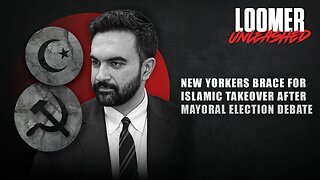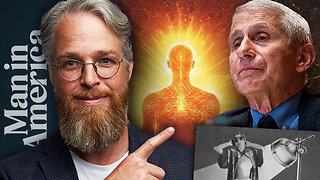Premium Only Content

Episode 3131: Born Again: What Did Jesus Really Mean? - Morning Episode
Meeting ID: 865 8978 0399
Passcode: Wjjv4960!
Speak Lord for your Servant is Listening
Book Recommendation of the Day
"The Letters of Pope Innocent I" (in various historical compilations)
• His responses to questions about canon law and church discipline, such as his letter to Decentius of Gubbio, are especially important.
• These are occasionally cited in canon law textbooks and studies on early papal authority.
Born Again: What Did Jesus Really Mean? A Catholic Response to Protestant Misinterpretations of John 3:5
Welcome to CR, where we proclaim the eternal truths of the Catholic Faith in the midst of a world lost in relativism and spiritual confusion. Today we are going to explore one of the most frequently quoted and most frequently misunderstood verses in the New Testament:
"Amen, amen I say to thee, unless a man be born again of water and the Holy Ghost, he cannot enter into the kingdom of God." (John 3:5, Douay-Rheims)
This verse is beloved by Protestants, especially Evangelicals and Baptists, who often ask, "Have you been born again?" But what did Our Lord truly mean when He said that we must be born again of water and the Holy Ghost? Was He referring to an emotional experience? A personal decision to accept Him? Or something far more profound and sacramental?
Today, we will examine this scripture through the lens of Sacred Tradition, the Church Fathers, and sound theology. We will also contrast this with the Protestant reinterpretation of this text, a view which emerged only during the upheaval of the Reformation. Let's begin.
The Catholic Interpretation of John 3:5
When Jesus speaks to Nicodemus in John 3, He is not engaging in metaphor. His words are precise, sacramental, and salvific. The Catholic Church teaches that this verse refers directly to the sacrament of Baptism.
The phrase "born of water and the Holy Ghost" has always been understood as referring to the external sign (water) and the interior grace (Holy Ghost) conferred during Baptism. This interpretation is supported not only by consistent Church teaching but by Scripture itself:
• Matthew 28:19: "Go therefore, and teach ye all nations; baptizing them in the name of the Father, and of the Son, and of the Holy Ghost."
• Acts 2:38: "Repent, and be baptized every one of you in the name of Jesus Christ, for the remission of your sins: and you shall receive the gift of the Holy Ghost."
The Church Fathers unanimously affirmed this understanding:
• St. Irenaeus (2nd century) wrote: "He came to save all through Himself: all, I say, who through Him are reborn unto God." He emphasized that this rebirth was through Baptism.
• St. Augustine stated: "No one becomes a member of Christ except it be through Baptism."
• St. Cyril of Jerusalem: "The water into which the body is plunged outwardly, the same signifies the inward purification of the soul by the Holy Ghost."
The Catechism of the Council of Trent affirms this:
"By the words 'born of water and the Holy Ghost,' Our Lord has declared the necessity of Baptism." (Part II, On Baptism)
Protestant Misunderstanding
In contrast to the traditional and scriptural interpretation of this verse, many Protestants propose a purely symbolic or emotional reading. They often claim:
1. "Born again" means making a personal decision to accept Jesus Christ.
2. "Water" refers to physical birth (amniotic fluid), not Baptism.
3. Baptism is merely a public declaration of faith, not a means of grace.
This view is theologically flawed for several reasons:
First, the Greek word used for "born again" (anothen) can also be translated as "born from above," emphasizing divine origin. But nowhere in Scripture is natural birth described as being "of water and the Holy Ghost."
Second, Protestant theology tends to reject the sacraments as efficacious means of grace, seeing them instead as human works. But Catholic teaching holds that sacraments are not works of man, but actions of Christ Himself. Baptism is not something we do for God; it is something God does for us.
Third, the Protestant view lacks historical support. None of the Church Fathers taught that "being born again" was a purely spiritual event disconnected from Baptism. That interpretation only appeared in the 16th century, making it a theological innovation.
To illustrate the point further:
• Martin Luther, though a Reformer, still held that Baptism had regenerative power.
• The modern Evangelical view is more the product of 19th-century revivalism than of apostolic Christianity.
Scripture is clear:
"He saved us by the laver of regeneration, and renovation of the Holy Ghost." (Titus 3:5) "Baptism doth now save you." (1 Peter 3:21)
These are not metaphors. These are realities.
The Importance of Right Understanding
Why does it matter how we interpret John 3:5? Because souls are at stake.
When Baptism is reduced to a mere symbol, the supernatural grace it confers is denied. When salvation is made into a matter of personal feeling rather than sacramental regeneration, people are left clinging to subjective emotions instead of objective grace.
The Church teaches that Baptism:
• Cleanses the soul from original sin.
• Infuses sanctifying grace.
• Incorporates the baptized into the Mystical Body of Christ.
• Makes the soul an adopted child of God.
• Opens the door to all other sacraments.
To ignore or downplay Baptism is to sever oneself from the very life of Christ.
Our Lord’s words to Nicodemus were not a vague spiritual exhortation. They were a divine mandate. Baptism is necessary. It is not optional. And it is not symbolic.
The Protestant misreading of John 3:5, though sincere in many cases, reflects a fundamental departure from the faith once delivered to the saints. Let us pray for our separated brethren, that they may rediscover the fullness of truth found only in the One, Holy, Catholic, and Apostolic Church.
“Justice, Mercy, and the Heart of the Law: Living the Gospel Authentically”
On this Thursday after the 2nd Sunday after Pentecost, June 26, 2025, the Church invites us to reflect on the harmony between justice and mercy that lies at the heart of authentic Christian living.
Epistle (from St. Andrew’s Missal, 1945)
Romans 8:18–23
“For I reckon that the sufferings of this present time are not worthy to be compared with the glory to come that shall be revealed in us. For the earnest expectation of the creature waiteth for the manifestation of the sons of God. For the creature was made subject to vanity, not of its own will, but by reason of him who hath subjected the same in hope. Because the creature also itself shall be delivered from the bondage of corruption into the glorious liberty of the children of God. For we know that the whole creation groaneth and travaileth together until now. And not only it, but ourselves also, who have the first-fruits of the Spirit, even we ourselves groan within ourselves, waiting for our adoption, to wit, the redemption of our body.”
Reflection on the Epistle
St. Paul reminds us that our present suffering, no matter how difficult, is slight in comparison to the glory that awaits us. Creation itself “groaneth and travaileth together,” longing for the fullness of redemption. In this, we find profound hope.
For those facing trials whether personal, ecclesial, or cultural this passage is a poignant reminder that God's plan transcends suffering. Our present struggles are temporary; they are not meaningless. And they root in a broader cosmic renewal.
As faithful Catholics, we must encourage one another: our sorrow is transformed by hope, and every trial becomes sacred when offered in union with Christ.
Gospel (from St. Andrew’s Missal, 1945)
Matthew 5:20–26
“Jesus said to His disciples: For I say to you: Except your justice abound, more than that of the Scribes and Pharisees, you shall not enter into the kingdom of heaven. You have heard that it was said to them of old time: Thou shalt not kill; and whosoever shall kill shall be in danger of the judgment. But I say to you that whosoever is angry with his brother shall be in danger of the judgment… Therefore, if thou bring thy gift to the altar, and there remember that thy brother hath ought against thee; leave there thy gift before the altar, and go first to be reconciled to thy brother, and then come and offer thy gift.”
Reflection on the Gospel
Here, Christ teaches that true righteousness must surpass external observance. It's not enough to avoid murder; anger, insult, and division are equally condemned. The first steps toward holiness involve the heart: anger must be rooted out. Discord must be healed.
Jesus emphasizes reconciliation ahead of worship unity precedes sacrifice. This is especially vital for the Church: we must cultivate internal charity before presenting ourselves before God. A sacramentally active community cannot thrive amid personal grudges or hidden division.
Let this passage guide us: actively seek forgiveness, let go of bitterness, foster unity among brothers and sisters only then can our worship be authentic and powerful.
Saint of the Day – Pope St. Innocent I (†417 A.D.)
According to the 1945 calendar, today we commemorate Pope St. Innocent I, a wise shepherd who defended both divine justice and compassion, particularly in upholding correct liturgical and doctrinal discipline. He intervened to protect the Church’s traditional integrity while guiding souls with pastoral charity a model of balanced leadership.
Themes & Quotes for Meditation
• Suffering and Hope: “For I reckon that the sufferings… are not worthy to be compared with the glory to come.” (Rom 8:18)
• Heartfelt Justice: “Except your justice abound… more than that of the Scribes and Pharisees…” (Matt 5:20)
• St. Augustine: “Command what You will, and grant what You command.”
• Themes:
1. Hope born of suffering
2. Internal justice that heals hearts
3. Unity foundational to authentic worship
Concluding Prayer
Let us pray:
O God, author of all consolation and justice, in Your loving plan, creation waits with longing for redemption. Grant us the grace to surrender our sufferings in hope, confident of the glory to come.
Inspire within us a righteousness deeper than mere avoidance of wrong—a justice of the heart that seeks unity, forgives betrayal, and reconciles with love. Grant us the humility to seek forgiveness and the courage to forgive.
Through the intercession of Pope St. Innocent I, may we lead lives rooted in truth, charity, and peace; and thus shine as lights in a world weighed down by bitterness.
We ask this through Christ Our Lord. Amen.
Our Lady, Seat of Wisdom, pray for our unity and purity of heart.
Thank you for joining. May these reflections guide your heart this day, rooted firmly in Christour hope, reconciliation, and crown. Deo gratias.
-
 14:08
14:08
Forrest Galante
10 hours agoPrivate Tour Of the World's Most Expensive Pet Show
129K9 -
 13:50
13:50
Nikko Ortiz
19 hours agoStop Hurting Yourself For Views.
13.8K7 -
 2:07:06
2:07:06
Side Scrollers Podcast
1 day agoDiaper Furry Streamer Gets ONLY ONE DAY Suspension + Hasan PLAYS VICTIM + More | Side Scrollers
44.2K22 -
 56:38
56:38
DeProgramShow
1 day agoDeprogram with Ted Rall and John Kiriakou: "Jake Tapper on the Global Hunt for an Al Qaeda Killer”
10.6K4 -
 1:43:07
1:43:07
The Michelle Moore Show
2 days ago'The 12 Open Doors' Guest, Steve Jarvis: The Michelle Moore Show (Oct 17, 2025)
21K11 -
 LIVE
LIVE
Lofi Girl
3 years agolofi hip hop radio 📚 - beats to relax/study to
104 watching -
 1:45:06
1:45:06
Badlands Media
1 day agoDevolution Power Hour Ep. 399: No Kings, Antifa’s Collapse & Trump’s Year of Peace
288K99 -
 2:56:00
2:56:00
Laura Loomer
13 hours agoEP150: New Yorkers Brace For Islamic Takeover After Mayoral Election Debate
87.5K108 -
 1:35:37
1:35:37
Man in America
17 hours agoThe Forbidden Medicine of Light: Why is Big Pharma HIDING This From Us?
71.7K30 -
 2:35:13
2:35:13
BlackDiamondGunsandGear
10 hours agoAFTER HOURS ARMORY / BUILDING GUNS ARE ILLEGAL? / Marine Gun Builder RETURNS!!
27.4K5